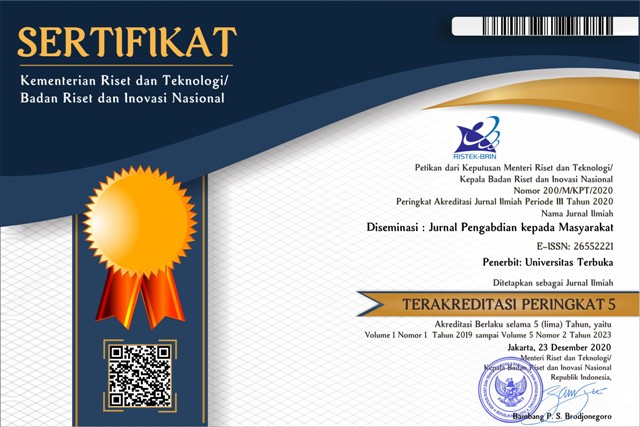KONSERVASI LINGKUNGAN MELALUI UPAYA KOMPOSTING TANDAN KOSONG KELAPA SAWIT (TKKS) DI DESA CIKARAWANG, KECAMATAN DRAMAGA, KABUPATEN BOGOR
DOI:
https://doi.org/10.33830/diseminasiabdimas.v3i1.1341Keywords:
composting, environmental conservation, konservasi lingkungan, oil palm empty bunch, pengomposan, tandan kosong kelapa sawitAbstract
Palm oli waste empty bunches (tkks) corn cob, corn leaf, rice straw, soybean leaf and others are very abundant in Cikarawang village, Dramaga district, Bogor Regency as an area of agricultural centers, especially during the harvest season. Along with the high production of palm oil, the solid waste TKKS often raises its own problems. Processing is not optimal, such as long-time composting often results in a very large pile of TKKS and potentially a host of pests and diseases. Whereas solid waste in the form of empty bunches of palm oil can be processed efficiently and effectively to be used as compost. Community service activities through Iptek Program for Society (IbM) in Cikarawang Village, Dramaga district, Bogor Regency directed to empower the community to utilize agricultural waste for environmental conservation. The method used is training and demonstration of how to practice the posting. Program participants are members of Cikarawang Village Farmer Group (Gapoktan). The results of empowerment through training and practice are positively responded by the participants. The farmer empowerment Program in this environmental conservation in the long term is expected to be a demonstration for farmer groups in other areas with better capacity and quality.
Limbah tandan kosong kelapa sawit (TKKS/janjang kosong) tongkol jagung, daun jagung, jerami padi, daun kedelai dan lain-lain sangat melimpah di desa Cikarawang Kecamatan dramaga Kabupaten Bogor sebagai suatu daerah sentra pertanian, terutama pada saat musim panen. Seiring dengan tingginya produksi minyak sawit, limbah padat TKKS sering menimbulkan permasalahan tersendiri. Pengolahan yang belum optimal, seperti pengomposan yang memakan waktu lama sering mengakibatkan tumpukan TKKS yang sangat besar dan berpotensi menjadi inang hama dan penyakit. Padahal limbah padat berupa tandan kosong kelapa sawit dapat diolah secara efisien dan efektif untuk dijadikan kompos. Kegiatan pengabdian kepada masyarakat melalui program Iptek bagi Masyarakat (IbM) di Desa Cikarawang, Kecamatan Dramaga, Kabupaten Bogor diarahkan untuk pemberdayaan masyarakat memanfaatkan limbah pertanian untuk konservasi lingkungan. Metode yang digunakan adalah pelatihan dan demonstrasi cara praktik pengomposan. Peserta program adalah anggota kelompok tani Desa Cikarawang (Gapoktan). Hasil pemberdayaan melalui pelatihan dan praktik direspons positif oleh peserta. Program pemberdayaan petani dalam konservasi lingkungan ini dalam jangka panjang diharapkan mampu menjadi percontohan bagi kelompok tani di daerah lain dengan kapasitas dan kualitas yang lebih baik.
References
Singh, R. P., Ibrahim, M. H., Esa, N., & Iliyana, M. S. (2010). Composting of waste from palm oil mill: a sustainable waste management practice. Reviews in Environmental Science and Bio/Technology, 9(4), 331-344. doi:10.1007/s11157-010-9199-2.
Syahwan, F. L. (2016). Potensi limbah dan karakteristik proses pengomposan tandan kosong kelapa sawit yang ditambahkan sludge limbah pabrik minyak kelapa sawit. Jurnal Teknologi Lingkungan, 11(3), 323. doi:10.29122/jtl.v11i3.1177.
Zainudin, M. H. M., Ramli, N., Hassan, M. A., Shirai, Y., Tashiro, K., Sakai, K., & Tashiro, Y. (2017). Bacterial community shift for monitoring the co-composting of oil palm empty fruit bunch and palm oil mill effluent anaerobic sludge. Journal of Industrial Microbiology & Biotechnology, 44(6), 869-877. doi:10.1007/s10295-017-1916.
Downloads
Published
Issue
Section
License
Copyright and Licensing

Diseminasi : Jurnal Pengabdian kepada Masyarakat is licensed under a Creative Commons Attribution-NonCommercial-NoDerivativeWorks 4.0 International License. Allows users to copy and distribute the Article, provided this is not done for commercial purposes and further does not permit distribution of the Article if it is changed or edited in any way, and provided the user gives appropriate credit (with a link to the formal publication through the relevant DOI), provides a link to the license, and that the licensor is not represented as endorsing the use made of the work.















